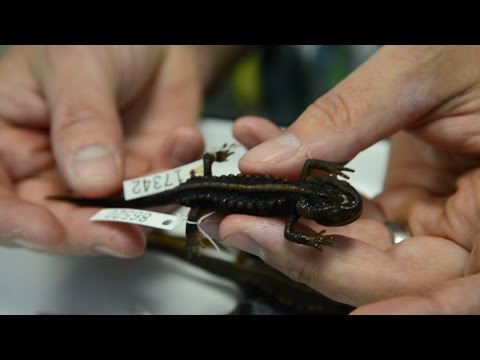Explore the World of Reptiles: Herpetologist Job Description and Salary

Herpetologist Job Description Template
Herpetologist Job Description A herpetologist is a scientist who specializes in the study of reptiles and amphibians. They are responsible for conducting research, collecting data, and studying the behavior, anatomy, ecology, and evolution of these species. Herpetologists may work in various settings including universities, government agencies, museums, or research institutions. The primary duties of a herpetologist include conducting fieldwork to observe and collect specimens, analyzing data, and documenting their findings. They may also be involved in the conservation and management of reptiles and amphibians, studying their habitats, and developing strategies for their protection. One important aspect of a herpetologist’s job is to educate the public about reptiles and amphibians. They may give presentations, lead workshops, or participate in community outreach programs to raise awareness about the importance of these species and their conservation. Another crucial responsibility of a herpetologist is to contribute to scientific literature by publishing research papers and sharing their findings with the scientific community. This helps in expanding the knowledge base and understanding of reptiles and amphibians. In addition to having a strong scientific background, herpetologists should possess excellent observational and analytical skills. They must be detail-oriented, patient, and passionate about reptiles and amphibians. Fieldwork often involves working in remote locations and challenging environments, so physical stamina and outdoor survival skills are also beneficial. In summary, herpetologists play a vital role in studying and conserving reptiles and amphibians. Their work contributes to our understanding of these species and helps in their protection and conservation efforts.Herpetologist Responsibilities
- Conducting research on reptiles and amphibians
- Studying the behavior, habitat, and ecology of different species
- Identifying and classifying different species of reptiles and amphibians
- Collecting and preserving specimens for further study
- Monitoring and assessing the health and population status of reptiles and amphibians
- Designing and implementing conservation programs to protect endangered species
- Educating the public and raising awareness about reptiles and amphibians
- Collaborating with other scientists and researchers in related fields
- Writing scientific papers and presenting research findings at conferences
- Providing expertise and advice to government agencies and organizations on herpetology-related matters
Herpetologist Requirements
How Much Does A Herpetologist Make?
Herpetologist Salary
| Level | Salary Range |
|---|---|
| Entry Level | $40,000 – $60,000 |
| Mid-Level | $60,000 – $80,000 |
| Senior Level | $80,000 – $100,000 |
A herpetologist is a scientist who specializes in the study of reptiles and amphibians. They conduct research, collect data, and analyze specimens to better understand these animals and their habitats. The salary of a herpetologist varies depending on their level of experience and expertise.
At the entry level, herpetologists can expect to earn a salary range of $40,000 to $60,000 per year. As they gain more experience and expertise, they can advance to mid-level positions with a salary range of $60,000 to $80,000. Senior-level herpetologists, who have extensive knowledge and experience, can earn a salary range of $80,000 to $100,000 or more.
It’s important to note that salaries can also vary based on factors such as the location of the job, the type of employer (government agency, research institution, or private company), and funding availability. Additionally, herpetologists may have opportunities for additional income through consulting work, teaching, or publishing research papers.
In conclusion, a career as a herpetologist can be rewarding both in terms of studying fascinating reptiles and amphibians and earning a competitive salary based on experience and expertise.
Herpetologist Salaries by Country
Top Paying Countries for Herpetologist
| Country | Average Salary (USD) |
|---|---|
| United States | $80,000 |
| Australia | $70,000 |
| Canada | $65,000 |
| United Kingdom | $60,000 |
| Germany | $55,000 |
Herpetologists are scientists who specialize in the study of reptiles and amphibians. They play a crucial role in understanding and conserving these species. The salary of herpetologists varies across countries. According to recent data, the top paying countries for herpetologists are the United States, Australia, Canada, the United Kingdom, and Germany. In the United States, herpetologists earn an average salary of $80,000 per year, making it the highest paying country for this profession. Australia, Canada, the United Kingdom, and Germany also offer competitive salaries ranging from $55,000 to $70,000. These countries provide excellent opportunities for herpetologists to pursue their passion while enjoying a rewarding income.
A video on the topic Herpetologist
Video Source : NCSU BITInterview Questions for Herpetologist
1. What is a herpetologist?
A herpetologist is a scientist who studies reptiles and amphibians.
2. What is the educational background required to become a herpetologist?
To become a herpetologist, one typically needs a bachelor’s degree in biology or a related field. However, advanced positions may require a master’s or doctoral degree.
3. What are the main responsibilities of a herpetologist?
The main responsibilities of a herpetologist include conducting research on reptiles and amphibians, studying their behavior, ecology, and evolution, identifying and classifying different species, and contributing to conservation efforts.
4. How do herpetologists study reptiles and amphibians?
Herpetologists use various methods to study reptiles and amphibians, such as field surveys, laboratory experiments, DNA analysis, and tracking techniques. They may also use remote sensing technology or work with captive populations.
5. What are some career options for herpetologists?
Herpetologists can work in various settings, including universities, research institutions, zoos, museums, government agencies, and conservation organizations. They may work as researchers, professors, wildlife biologists, or environmental consultants.
6. What are the biggest challenges herpetologists face in their work?
Some of the biggest challenges herpetologists face include habitat loss and degradation, climate change, pollution, illegal wildlife trade, and invasive species. These factors can greatly impact reptile and amphibian populations, making conservation efforts crucial.
7. How do herpetologists contribute to conservation?
Herpetologists contribute to conservation by studying threatened and endangered species, monitoring populations, identifying key habitats, and developing conservation strategies. They also raise awareness about the importance of reptiles and amphibians in ecosystems and advocate for their protection.
8. Can you give an example of a significant discovery made by herpetologists?
One significant discovery made by herpetologists is the identification of new species. For example, in recent years, herpetologists have discovered new frog species in remote rainforests and documented previously unknown reptile species in various regions of the world.
9. How do herpetologists communicate their research findings?
Herpetologists communicate their research findings through scientific publications, presentations at conferences, and collaboration with other scientists. They may also engage in public outreach activities, such as giving talks, writing articles, or participating in educational programs.
10. Why is the work of herpetologists important?
The work of herpetologists is important because reptiles and amphibians play crucial roles in ecosystems. They help control pest populations, serve as indicators of environmental health, and contribute to nutrient cycling. Understanding their biology and conservation needs is essential for maintaining biodiversity and ecological balance.






